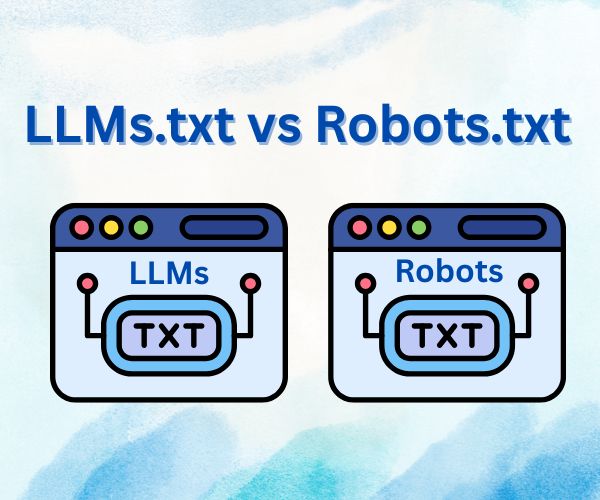In the age of AI and search engines, how your website content is accessed, used, and indexed matters more than ever. Traditionally, robots.txt has been the tool webmasters use to control how search engine bots crawl their sites.
But with the rise of Large Language Models (LLMs) like ChatGPT, Claude, and Gemini scraping and training on public internet data, the idea of an LLMs.txt has emerged – even though it’s not officially recognized yet.
So, what’s the difference between robots.txt and LLMs.txt? Why is this comparison even relevant? And what can content creators, webmasters, and businesses do to protect their content from being used without consent?
Let’s dive in.
What Is Robots.txt?
Robots.txt is a standard text file placed in the root directory of a website (e.g., www.example.com/robots.txt). Its purpose is to instruct web crawlers (bots) on which parts of your website they’re allowed to crawl or index.
💡 Example of Robots.txt:
User-agent: *
Disallow: /private/
Allow: /public/
This tells all bots (User-agent: *) not to access anything under /private/, but allows crawling of /public/.
✅ Who Follows Robots.txt?
- Googlebot (Google)
- Bingbot (Microsoft)
- YandexBot
- DuckDuckBot
- Some social media crawlers
These bots typically obey the instructions, though not all crawlers do (e.g., malicious scrapers often ignore robots.txt).
What Is LLMs.txt?
LLMs.txt is not an officially adopted standard. Instead, it is a proposed or theoretical file that website owners could use to signal to AI crawlers and Large Language Model providers (like OpenAI, Anthropic, Google, etc.) that their content should not be scraped or used for training.
Purpose of LLMs.txt:
- Prevent AI models from using your site’s content for training or generation.
- Signal to LLM companies that your content is not for AI consumption.
- Protect copyright, proprietary data, or paid content from being ingested by AI.
Current Use Cases:
Some companies (like OpenAI) allow sites to block AI crawlers by using entries in robots.txt like:
CopyEditUser-agent: GPTBot
Disallow: /
But if LLM-specific crawlers increase, the idea of a dedicated llms.txt file might become useful, especially to separate SEO crawling from AI training crawling.
LLMs.txt vs Robots.txt – Key Differences
| Feature | Robots.txt | LLMs.txt (Proposed) |
| Official Standard | ✅ Yes (part of REP – Robots Exclusion Protocol) | ❌ No (not officially adopted) |
| Purpose | Controls bot crawling for indexing | Blocks AI models from training or reading |
| Used By | Search engines (Google, Bing, etc.) | Potentially AI crawlers (OpenAI, Anthropic) |
| Enforced By | Mostly respected, not enforced legally | Voluntary respect by AI companies |
| Example File Location | yourdomain.com/robots.txt | yourdomain.com/llms.txt (conceptual) |
| Granular Control | Yes (URLs, folders, files) | Theoretically yes (if standardized) |
Why This Difference Matters
As AI continues to expand, many website owners and publishers are asking:
“Can I control whether LLMs like ChatGPT access my content?”
Currently, the answer is partially yes, via robots.txt – if the AI companies choose to honor it.
But if more AI systems emerge that don’t identify themselves via a user-agent or don’t respect robots.txt, we may need a new standard, like llms.txt, to:
- Differentiate AI model training from search engine crawling
- Set ethical boundaries around web content usage
- Enable legal or standardized control of how data is used by LLMs
How to Block LLM Crawlers Today
Here’s how you can prevent OpenAI’s GPTBot and other known LLM crawlers from accessing your site using robots.txt:
User-agent: GPTBot
Disallow: /
User-agent: ChatGPT-User
Disallow: /
User-agent: ClaudeBot
Disallow: /
User-agent: *
Disallow: /private-data/
Note: This works only if the LLMs identify themselves and respect robots.txt. Not all do.
Also check Top 21 Common Technical SEO Issues
Examples & Use Cases
✅ Example 1: News Publisher
A media site like The New York Times wants to block AI from using its premium content. It uses robots.txt to disallow GPTBot and ClaudeBot. In the future, it could use llms.txt to list acceptable use cases or even monetization conditions.
✅ Example 2: Academic Database
An academic journal might allow indexing by Google Scholar but not allow AI training use. With robots.txt + a future llms.txt, it can distinguish between indexing for humans and scraping for LLMs.
✅ Example 3: Creative Blog
A poetry blogger may want SEO traffic but not want their work reused in AI-generated outputs. They can allow Googlebot but disallow AI crawlers.
FAQs – People Also Ask
1. Is LLMs.txt a real file?
No, it’s not currently a recognized standard, but it’s a concept gaining interest due to the rise of AI scraping.
2. Can I block AI models like ChatGPT from accessing my site?
Yes, partially – you can use robots.txt to block known AI crawlers like GPTBot, but compliance is voluntary.
3. Will search engines ever use LLMs instead of traditional bots?
Some already do. Google’s Search Generative Experience (SGE) and Bing Chat combine LLM outputs with traditional search. The lines are blurring.
4. What happens if I don’t use robots.txt?
Your site will be open to crawling and indexing by most bots, including AI models that don’t check for opt-out signals.
5. Is there a legal way to stop AI models from using my content?
Legal frameworks are evolving. Some publishers are suing AI companies over copyright, but there is no universal law as of now.
Final Thoughts
The battle between open data and content ownership is heating up. While robots.txt remains your best tool for controlling search engine crawlers, the concept of LLMs.txt is a signal that more granular content control is needed in the AI age.
Whether it becomes a true standard or not, expect more webmasters, publishers, and governments to demand clearer rules for AI content usage, scraping, and attribution.
As AI becomes the default interface for accessing knowledge, knowing how to protect your digital assets is more critical than ever.


